Auditioning: Behind the Curtain
October 5, 2017
These past two weeks, Thespians, the theater club at State High, entered into the first stage of producing their fall play, House at Pooh Corner. Auditions are the first step in creating a cast that will be rehearsing every day for the next six weeks to develop characters, memorize lines, and perform their show. Auditions can be a very stressful, or a very easy experience based on the actor. Connor Shea, a junior and auditioner for three years, auditioned this past Monday.
Connor said that the “heat of the moment” was both the best and worst part of auditioning. “(The best part is) when you get on stage and you do something you weren’t planning to do or expecting to do so it turns out good, so the heat of the moment part of it. But the worst part is also the heat of the moment part of it. When you worked to actually prepare and you mess it up on stage and it’s all for nothing.” Connor wants to be a part of this show both for the joy of performing and because he doesn’t want to “break my streak.” Connor has also applied to tech positions in order to help out with the show in case he is not cast.
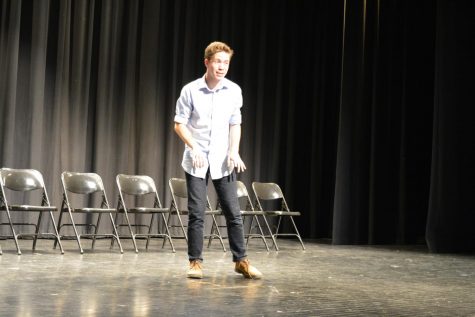
The audition process starts with an audition workshop where everyone learns what the director, Jill Campbell, expects for a good audition. She even has experienced auditioners act out a terrible audition so that she can outline what they did wrong.
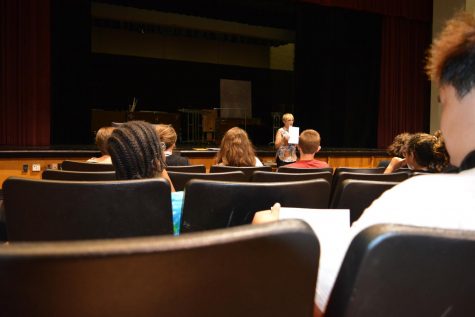
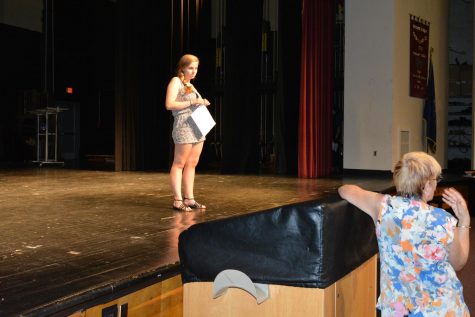
After this, it is up to the actors to try to memorize their lines, prepare for audition day, and sign up for an audition time slot.
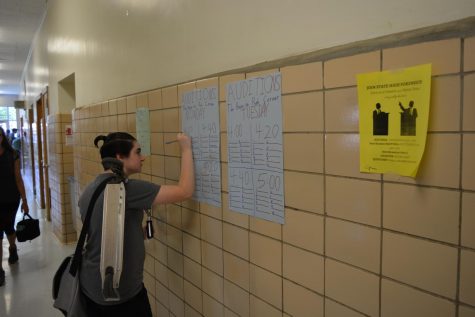
During the first part of the audition the auditioners file on stage and sing a song from the show in pairs. This helps the director, Jill Campbell, see how they interact with different people in different roles. Studying relationships is a critical part of the selection process, one that Ms. Campbell takes into great consideration. “Relationships are incredibly important. If a child and a parent don’t feel like a parent and a child it won’t seem authentic.” Ms. Campbell said that reading and making an image in her head was a key aspect of the audition process. “I read the show over and over and over again and as I read it I get a personality in my mind for each of the characters and I jot those things down as the come to me so that I have a character description for each character, so when the students audition I take that into account…But it all is a character type thing.
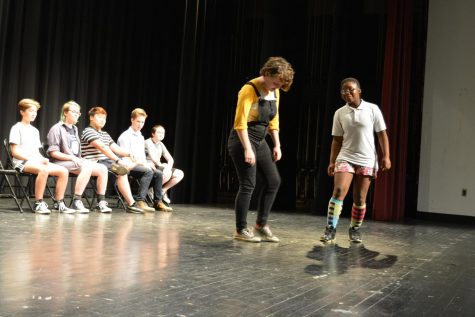
The auditioners also recite two different lines from two different character standpoints. They cross the stage saying these lines, allowing them to demonstrate their version of the physicality of each character, a key aspect of auditioning.
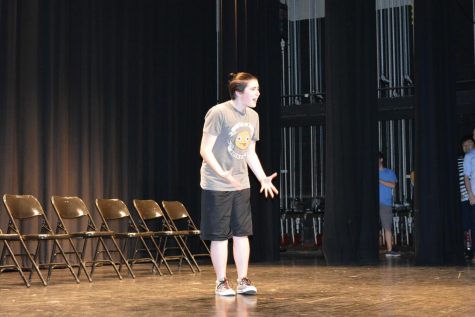
After all of this, the auditioners are done. They can leave the stage to let in the next group and await the posting of the cast list. Before the cast list is posted, however, the call-back process begins. The call back process is where Ms. Campbell calls back a select group of people for another audition. Ms. Campbell says that “usually there are two reasons for callbacks, one I saw an inkling and thought that it might be a good fit but I needed more information. Two, if there’s going to be a relationship played between people sometimes I really need to have a chance to see people work together who didn’t work together in the initial audition, who weren’t in the same audition group.” Some actors take this as a good sign – that a call back means that they’re definitely being cast. This, however, is not true. Callbacks do not guarantee a role in the show, they are just another form of assessment. Since there are so many people auditioning for the same roles, there has to be some cut backs. Ms. Campbell said that auditioning is “the most exciting thing we do and the hardest thing we do. It’s exciting to see a cast form always and see those people and get excited to get started and get a show of the ground. But it’s also difficult to disappoint and reject an auditioner.”
But, in the end, Ms. Campbell still believes in the system. “I feel like we’ve really had good, nice fit casts for years and years (and) I think it’s worked really really well. Casting for the fit and that gut feeling that that person is going to be able to really fill this role beautifully and believably for an audience has worked incredibly well.”
During this time technical theater positions are also determined. Jobs like Lighting Designer, Assistant to the Scenic Designer, Master Carpenter, etc are doled out based on experience, drive, and work ethic. The Scenic Designer and Technical Director; Jennifer & William Kenyon, interview students for each of these positions.
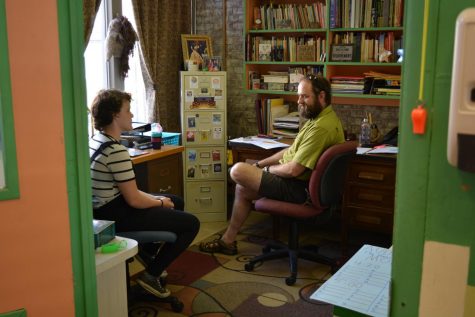
This process typically determines the technical excellence of the show. Good technical theater crews and good casts must work together to make a good production in the end. Due to the large number of technical and acting awards that Thespians Troupe 5024 has won at the Isaac’s Awards in Altoona, International Thespians Society Conference in Pennsylvania and Nebraska, and AHSTF in Edinburgh, and their general success locally, the troupe can attest that this system works.
